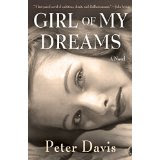Peter Davis Stops by to Share His Latest Novel Girl of My Dreams and Giveaway
 What
inspired you to write GIRL OF MY DREAMS? How was the process of crafting a different
from your previous non-fiction writing?
What
inspired you to write GIRL OF MY DREAMS? How was the process of crafting a different
from your previous non-fiction writing?
Though I loved hearing
stories about the time before my time -- the so-called "old days in
Hollywood" before the war -- none of them ever quite satisfied me, so I
finally had to write my own. Actually, those ancient tales inspired me to
imagine a reality that might have been. I grew up in Hollywood yet on its
fringes, the son of screenwriters, in the decades that followed the one I write
about. Anecdotes about infighting at the studios, the breadline lives of
millions of Americans during the Depression, and the Communists' answer to
economic inequality all informed my childhood. I'd always intended to write
fiction someday. It felt natural. That doesn't mean it was easy because it
wasn't. Girl of My Dreams went through eighteen drafts.
Given your
parents’ careers as screenwriters, how much of their experiences informed the
development of Owen’s character? How did your own involvement in the business
shape the character of Owen?
Neither my parents'
careers nor their experiences led me directly to Owen. Yet their stories did.
What would happen to a young wide-eyed guy, full of the eagerness to please and
at the same time with overweening ambition, as he wended his way through the
labyrinth of Hollywood. When I was making films, they were always documentaries
either at CBS News or later as an independent. And almost always I worked in
New York. After I left California for college at Harvard, I never lived on the
west coast as an adult except for one year. That one year was the second half
of my making the film on the Vietnam War, Hearts and Minds. I was hardly ever
out of the cutting room during that year -- June 1973 to June 1974 -- but yes,
I did absorb a good deal about Hollywood then. I can't say anything in
particular seeped into my novel, but I'm sure some of the atmosphere, the
penchant at the studios for conspiracy, did inform my approach to Girl of My
Dreams.
Real
“characters” make cameo appearances throughout the book. Why did you choose to
include stars and starlets of their day? What’s the trick to balancing real
people with fictitious characters?
The occasional real
figures who appear in my novel simply seemed to come in naturally. I never
dragged in someone because I wanted him or her to make a plot point. I felt my
characters, and the experiences everyone was having at Jubilee Pictures,
couldn't exist in a vacuum, so I had a few of their contemporaries show up. In
San Francisco, it was impossible to write about the dockworkers' strike of 1934
without the presence of the legendary labor leader Harry Bridges.
Your story
is set against the backdrop of Hollywood in the 1930s. How does this setting
enhance the narrative? What personal experiences of yours helped establish
authenticity of time and place?
A great question. The
authenticity of the setting was crucial to me. I spent a lot of time in the
Motion Picture Academy reading issues of Variety from 1933, 1934, and 1935.
Similarly, the memoirs and biographies of all kinds of film people helped me
establish the ground beneath my characters' feet, the backdrop as you put it.
The real-life issues you mention are in one sense the same as they are today. An
umbilical cord stretches from that time to this connecting ambition, fear, the
incessant pursuit of success, both the rewards and ravages of fame, and the
burst of creativity that filmmaking involves even when reined in by commercial
demands. In another sense the real-life issues are different; no one cares
about the Communist Party in America anymore, and the Great Recession we have
passed through bears little resemblance to the Great Depression that fed the
native Communists. Yet those very issues, with all their differentness, led to
the world we inhabit today; the seeds for World War II were growing in the
Thirties, the labor movement that lasted for about seventy years was ignited in
the Thirties, and the Greatest Generation itself was passing its first test
simply by surviving the Depression.
How do you
see Hollywood as having evolved since the Golden Age? What age-old issues are
still the same today?
There is a great deal of
continuity in the way people succeed and fail, the way they hope and despair,
in Hollywood. The big changes are the decline of studio control and the rise of
directors as the prime artists in filmmaking. In the Thirties the artist was
often (not always) the studio itself. The most powerful individual was not the
director but the producer, who was the studio's representative. At one point in
my novel, the studio head, Mossy Zangwill, pays tribute to his writers this
way. "'In the beginning was the word,' Mossy said to his salaried
dreamers, 'and in the end is my word. If you guys don't do your job, no one
else has a job.' That didn't mean writers were happy; always disgruntled, they
had to sit still for being condescended to by everyone else in the food
chain." Except for the fact it's sometimes a director, sometimes a star,
sometimes still a producer, you won't find too many people in Hollywood,
regardless of their particular jobs, disagreeing with that assessment of the
writers' place and plight today.
Thank you to Peter Davis for stopping by! Would you like to win a copy of the novel? Please see the rafflecopter below:



Comments
Post a Comment